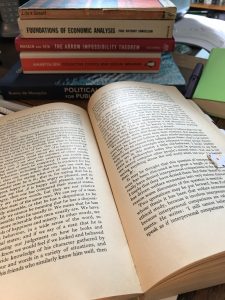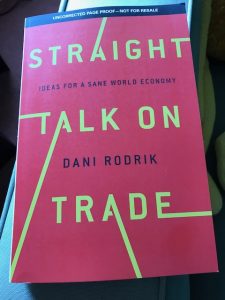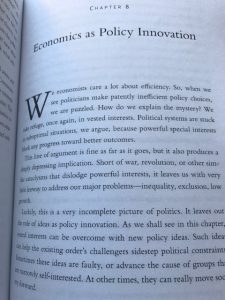The Google memo affair has sent me quickly to the proofs of a book coming out next month, Scott Page’s The Diversity Bonus. (Here is all the blurb for the book,)
[amazon_link asins=’B06ZZ6DBTQ’ template=’ProductAd’ store=’enlighteconom-21′ marketplace=’UK’ link_id=’e299aa86-7cd1-11e7-ad90-7be27361206a’]
Page wrote an excellent book a few years ago, The Difference, covering his early research on how and why diversity contributed to better (faster & more accurate) problem-solving.
[amazon_link asins=’0691138540′ template=’ProductAd’ store=’enlighteconom-21′ marketplace=’UK’ link_id=’09393558-7cd2-11e7-b124-333f3e50c3eb’]
The new book, judging from the intro, looks at how diversity contributes to profit. By ‘diversity’ he means a range of different cognitive approaches. Identity is one contributory factor to cognitive diversity, because it reflects the different experiences, networks and knowledge different types of people have; but it is not the only factor. However, it is a relatively easy one to monitor. What’s more, the more multi-dimensional and complex the business activity (eg coding, systems engineering), the more profitable it will be to have cognitively diverse teams. In other words, even if it were true that women were less likely on average to be good coders because of their biology – a doubtful proposition as today’s FT leader and many others (such as Prof Wendy Hall here ) point out – Google should still be eager to hire more of us.
If political correctness is profitable, is it still political correctness? Anyway, I’m looking forward to reading the book properly.
The business also sent me back to Simone de Beauvoir’s The Second Sex.
[amazon_link asins=’009974421X’ template=’ProductAd’ store=’enlighteconom-21′ marketplace=’UK’ link_id=’fdc546cd-7cd2-11e7-9db5-13b228cd4cb6′]
“In human society nothing is natural and a woman, like much else, is a product elborated by civilization. The intervention of others in her destiny is fundamental: if this action took a different direction, it would produce quite a different result. Woman is determined not by her hormones or mysterious instincts but by the manner in which her body and her relation to the world are modified by the action of others than herself. The abyss that separates the adolescent boy and girl has been deliverately widened between them since earliest childhood.”
‘Destiny’ is not predetermined. Biology does not mean women can’t become coders, chief executives, or economists. Even if the distributions of aptitude for certain activities differ by sex among adults – and it seems highly unlikely that the between-group differences are larger than the within-group variation – those distributions are the outcome of two decades of socialisation and social constraints.
 I read it again quickly in the past couple of days & flashed back to being so gripped by it as a young teen that I stayed up into the night reading it. As I finished, I noticed a blister on my arm, and ran to my bemused mum calling out that I had the plague. In the unheated house we lived in, we went to bed with cylindrical metal hot water bottles stuffed into old socks, & I’d failed to notice mine burning me through a hole in the sock. At that age, and being so literal minded, I didn’t spot the book’s metaphorical meaning….. As Camus says, there is much we can learn from books, if we pay attention.
I read it again quickly in the past couple of days & flashed back to being so gripped by it as a young teen that I stayed up into the night reading it. As I finished, I noticed a blister on my arm, and ran to my bemused mum calling out that I had the plague. In the unheated house we lived in, we went to bed with cylindrical metal hot water bottles stuffed into old socks, & I’d failed to notice mine burning me through a hole in the sock. At that age, and being so literal minded, I didn’t spot the book’s metaphorical meaning….. As Camus says, there is much we can learn from books, if we pay attention.


